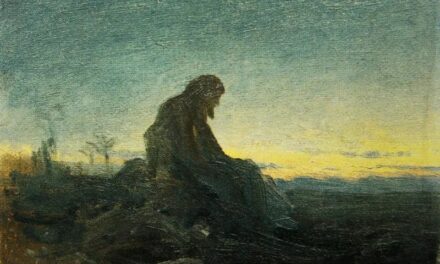We support our Publishers and Content Creators. You can view this story on their website by CLICKING HERE.
Fr. Ian Boyd was one of the most beautiful representatives of that culture that goes by the name of “conservatism.” His name will forever remain linked to that of G.K. Chesterton, and especially to “The Chesterton Review.”
The founder of The Chesterton Review, emblem of a conservatism we miss, passed away at 88.
Fr. Ian Boyd, one of the greatest experts and interpreters of the work of English writer Gilbert Keith Chesterton, passed away on January 10, 2024, at the age of 88. He had celebrated the 60th anniversary of his priestly ordination on December 15, 2023.
A Canadian, he had grown up in Blaine Lake, Saskatchewan. The vocation visited him as a boy, in the guise of his brother Leo, an Oblate missionary father committed to bringing Christ to the Indian communities in the Northwest Territories. Boyd opted for the Congregation of the Basilian Fathers, an order born in France on November 21, 1822, when ten diocesan priests decided to defy the anticlerical and anti-Christian laws enacted during the French Revolution, and still in force then, by opening a seminary in a small village in Ardèche and choosing Basil the Great as their inspirational patron saint.
After obtaining a Ph.D. at the University of Aberdeen, Canada, Fr. Boyd taught Christian Literature at St. Thomas More College in Saskatoon, Canada, then at Seton Hall University in South Orange, New Jersey, until his retirement in 2019. As a profound connoisseur, he discussed and interpreted with loving intellect the literary work of T.S. Eliot and C.S. Lewis, Flannery O’Connor, and Malcolm Muggeridge, Hilaire Belloc and Christopher Dawson, Graham Greene and Evelyn Waugh, Maurice Baring and Muriel Spark, Charles Dickens and Nathaniel Hawthorne, and many others, but certainly his name will forever remain linked to that of Chesterton, and especially to The Chesterton Review.
That magazine, which turns half a century old this year, was born in a different time and in a different world, when printing smelled of lead and proofreaders were an indispensable commodity. Fr. Boyd put it together for the exact opposite purpose of the lavish wordy criticism that ends up drowning the inspiration of those geniuses of humanity we call artists, and who leave us legacies so that there can be a posterity, in pointless commentaries to pointless commentaries. Fr. Boyd created The Chesterton Review not to revel in the echoes of his own interpretations, as it happens to so many “cultural sections,” but to leave room for the irrepressible offshoot of the talent of an author he elected as a model to be imitated due to his ability to stimulate and sting, instigate and disturb the idle slumbers in which the human soul wanders, when it forgets that on Earth it is only traveling.
The Chesterton Review is a permanent invitation to confrontation with a magisterial spirit and through him to the encounter with other spirits, similar and different, equally great, always great, were it not for the courage to unveil themselves bare through writing and reveal the depths and abysses of the human soul.
Five decades later, that magazine has grown into an emblazoned peer-review scholarly publication with very few counterparts, around which Fr. Boyd later created the G. K. Chesterton Institute for Faith & Culture. His Seton Hall University welcomed it as a prime asset and now it survives him. Unforgettable signatures and inescapable names have crossed its pages, and at the end of the road there remains a pot overflowing with gems, beautiful, literally, in its sparse packaging and its essential message, its true writing and its noble purpose.
Personally, I came to know The Chesterton Review in the early 1990s in the same way I came to know much of that wonderful world: through master Russell Kirk. I began flipping through its pages in his wooden library in Mecosta, Michigan, where Kirk kept, as in an arsenal, the weapons of the spirit and of the intellect as well as of the heart. There was a complete collection of the magazine. Later I began to own my first issues of it, looking for older issues and always waiting for the new one to come out. On its pages, I would see flowing names-talents I had already met elsewhere, thanks to Kirk, or whose greatness I was discovering for the first time. It was like seeing the best of an entire world lined up together.
 Fr. Boyd was one of the most beautiful representatives (I cannot find a similarly succinct and precise adjective than “beautiful”) of that culture that goes by the name of “conservatism.” To say it today, in a time when the term, after years of censorship and exile, has broken through the front door of public rhetoric to become already prey to the shovellers of culture and usury, caricature and inflation, makes one’s hands shake at the keyboard. One would not want to be unfair to Fr. Boyd, neither to him nor to kindred spirits, by throwing it in mess as in mess it has already been thrown. But one cannot resist either: Fr. Boyd was a deep conservative, and this has to do with the attitude of the soul, the cultivation of the spirit, life as “militia” even though in the recondite of a writing desk. Today, in an age when conservatism is on the lips of so many, we miss Fr. Boyd’s conservatism.
Fr. Boyd was one of the most beautiful representatives (I cannot find a similarly succinct and precise adjective than “beautiful”) of that culture that goes by the name of “conservatism.” To say it today, in a time when the term, after years of censorship and exile, has broken through the front door of public rhetoric to become already prey to the shovellers of culture and usury, caricature and inflation, makes one’s hands shake at the keyboard. One would not want to be unfair to Fr. Boyd, neither to him nor to kindred spirits, by throwing it in mess as in mess it has already been thrown. But one cannot resist either: Fr. Boyd was a deep conservative, and this has to do with the attitude of the soul, the cultivation of the spirit, life as “militia” even though in the recondite of a writing desk. Today, in an age when conservatism is on the lips of so many, we miss Fr. Boyd’s conservatism.
I met Fr. Boyd when he traveled to Italy. Tall, wiry, lovable, sweet. Educated and deep, in love with his priestly service and the “humanæ litteræ” of which he had made himself a servant. Fr. Boyd was one of those characters with an unequivocal vocation. Literature was the way in which he came to know and taught himself the meaning of things and life, the way in which he drove himself to discover the mystery of Christ in its fleshly reality of blood and bones that become an indispensable culture: the way in which human beings, otherwise naked after the original sin, coat themselves with robes and armor, domestic walls and forts, in order to face the earthly pilgrimage by reducing as much as possible the wounds and sores of the journey, to then reach the last port.
Fr. Boyd has reached the last port, and he has sailed. Beyond. Now with his Chesterton and his Eliot, his Lewis and his Dickens, his Kirk and all the other extraordinary spirits of that rich world he converses amiably, knowing the whole no longer by mere groping.
I imagine a profound and limitless scene, eternally present and overflowing, of which only pale, very pale announcements were, for me, the affable and savory chats in Italy, when I interveiwed Fr. Boyd for a radio show on Chesterton at Radio Maria Italy and on another occasion, a dinner, held in his honor, to which he wanted to invite me, hosted by the embassy of his Canada to the Holy See. Now that Fr. Boyd’s banquet is more sumptuous, does not cause ill health and will never end, I dare to ask him if he would like to reserve a seat for me. I will wear the cufflinks and tie clip bearing the seal of his Seton Hall University that he presented me as a gift.
The Imaginative Conservative applies the principle of appreciation to the discussion of culture and politics—we approach dialogue with magnanimity rather than with mere civility. Will you help us remain a refreshing oasis in the increasingly contentious arena of modern discourse? Please consider donating now.
The featured image is “A Funeral” (1883) by Frants Henningsen, and is in the public domain, courtesy of Wikimedia Commons. The image of Fr. Boyd is courtesy of Seton Hall University.

 Conservative
Conservative  Search
Search Trending
Trending Current News
Current News 






